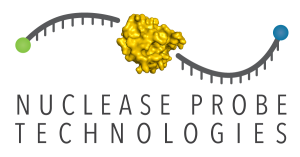

James McNamara, Scientific Founder and CEO of Nuclease Probe Technologies
Nuclease Probe Technologies, one of 21 MedTech startup finalists in the 8th annual M2D2 $200K Challenge, was chosen for their development of a novel diagnostic for accurate and early detection of bloodstream infections (BSI’s).
We spoke with Scientific Founder and CEO, James McNamara, who shared the story of their innovation with us.
What was the genesis or inspiration for your idea?
Several years ago, my research assistant repeatedly found a result that just didn’t make any sense. She was working with chemically modified RNA in a cell culture. The RNA was resistant to serum nucleases and should have been stable when added to the cells, which were cultured with bovine serum, but we found that it was being degraded, rapidly.
In troubleshooting this, we realized that the cells were contaminated with mycoplasma. When we eliminated the mycoplasma, the RNA was no longer degraded. We soon determined that the RNA was being degraded by a nuclease that was produced by the mycoplasma. It then occurred to us that other bacterial species, such as high impact pathogens, might also have nucleases with similar properties.
If so, we could possibly use this property to specifically detect bacteria in various clinical specimens. This could provide a novel molecular diagnostic approach for various infectious diseases. We began exploring this possibility and a lot of things quickly fell into place.
What are the most significant barriers you’ve faced and overcome?
The primary non-funding (and non-scientific) barrier I’ve overcome is identifying and recruiting qualified and talented business advisers. Steve Pemberton and Philippe Nore have just the background and business experience that the company needs. They provide invaluable input and guidance and a lot of effort in moving the company forward. It was a real game-changer when they joined the team.
 Can you share a “Eureka!” moment—a breakthrough in the development of your idea?
Can you share a “Eureka!” moment—a breakthrough in the development of your idea?
Our most basic nuclease detection methods have truly outstanding sensitivity. However, in trying to develop assays that can detect vanishingly low concentrations of bacteria in patient blood samples, which is necessary for effectively diagnosing bloodstream infections, we needed every ounce of sensitivity we could get.
We have optimized many components of the assays, and the various increases in sensitivity all add up. However, at one point we realized that if we could capture the nuclease molecules from a large volume (say, several milliliters of patient blood) and concentrate it into a much smaller volume, we could greatly enhance our sensitivity.
We explored different routes to do this, but monoclonal antibodies (i.e., immunoprecipitation) really took our assays to a different level. We select for antibodies that don’t impair the enzymatic activity of the targets so we don’t have to elute the nucleases prior to measuring their enzymatic activities.
If you win, what’s next?
If we win, we will use the prize to further advance our efforts to address the global needs for rapid, sensitive, and low-cost methods for diagnosing life-threatening infectious diseases.
About Nuclease Probe Technologies
Nuclease Probe Technologies identifies bacteria directly from the blood of patients suspected of having life-threatening bloodstream infections and analyzes the bacteria to determine the most appropriate antibiotic therapy—rapidly, accurately, and at cost that makes sense in today’s healthcare economy.
You’re invited to meet ALL 21 finalists in person at the two upcoming events that will conclude the Challenge:
- Challenge Pitch-Off—Wednesday, March 27 at 5:00 pm, University Crossing, 220 Pawtucket St., Lowell
- Finalist Awards & Networking Event—Wednesday, April 10 at 5:00 pm, Mintz, 1 Financial Center, Boston
For more information and tickets, visit https://www.eventbrite.com/e/2019-m2d2-200k-challenge-finalist-showcase-pitch-off-events-tickets-56587606053
